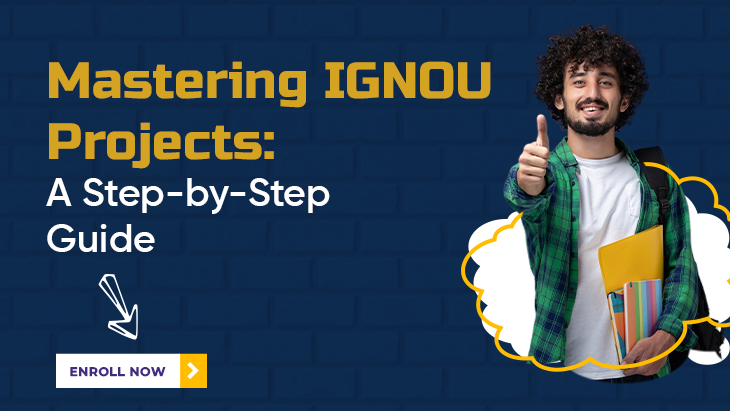It is crucial to understand and follow the structural framework of approaching and excelling in IGNOU projects since it is quite different from conventional methodologies. Whether you are studying to get the Master of Commerce (M.Com) or any other course through IGNOU, efficient management of the projects is mandatory. As implied in the earlier sections of the guide, the framework that is presented below will enable you to approach your IGNOU projects with a lot of confidence.
Understanding IGNOU Projects
IGNOU, or the Indira Gandhi National Open University, is renowned for its flexible learning programs and comprehensive project requirements across various disciplines. The projects serve as a crucial component of the assessment, allowing students to apply theoretical knowledge to practical scenarios and demonstrate their understanding of the subject matter.
Step 1: Choosing the Right Project Topic
Selecting an appropriate project topic is the foundational step towards a successful IGNOU project. Here’s how you can approach it:
- Align with Your Interests: Choose a topic that aligns with your academic interests and career aspirations. This will help maintain your motivation throughout the project’s duration.
- Relevance and Scope: Ensure that the topic is relevant to your course curriculum and has a manageable scope for the given timeframe.
- Research Availability: Verify the availability of research material and resources related to your chosen topic to facilitate comprehensive analysis and study.
Step 2: Understanding the Project Guidelines
Each IGNOU program has specific guidelines regarding project format, structure, and submission requirements. It is essential to thoroughly review the project handbook or guidelines provided by IGNOU to ensure compliance. Key aspects include:
- Format and Structure: Understand the prescribed format for the project report, including sections such as introduction, literature review, methodology, findings, conclusions, and recommendations.
- Submission Deadlines: Note the deadlines for proposal submission, project report submission, and any interim evaluations or presentations required by your program.
- Evaluation Criteria: Familiarize yourself with the evaluation criteria used by IGNOU assessors, focusing on aspects such as originality, depth of analysis, clarity of presentation, and adherence to academic standards.
Step 3: Planning and Scheduling
Effective project management depends heavily on meticulous planning and scheduling. Consider the following steps:
- Create a Project Plan: Develop a comprehensive project plan that outlines tasks, milestones, and timelines in detail. Use tools like Gantt charts to visualize the project schedule and dependencies.
- Allocate Resources: Identify the resources required for your project, including access to libraries, databases, and equipment. Allocate sufficient time for research, data collection, and analysis.
- Set Realistic Milestones: Break down the project into manageable milestones and set realistic deadlines for each phase. This will help you stay on track and monitor progress effectively.
Step 4: Conducting Research and Data Collection
Research forms the backbone of any IGNOU project. Here’s how you can approach the research phase:
- Literature Review: Conduct a thorough literature review to understand existing theories, studies, and perspectives related to your topic. Critically analyze the literature to identify gaps or areas for further exploration.
- Primary Data Collection: Depending on your project’s requirements, collect primary data through surveys, interviews, experiments, or case studies. Ensure ethical considerations and data validity throughout the collection process.
- Data Analysis: Use appropriate analytical tools and techniques to analyze the collected data. Present your findings clearly, using tables, charts, and graphs to enhance understanding and interpretation.
Check Out: IGNOU MBA Project!
Step 5: Writing the Project Report
Writing a cohesive and well-structured project report is crucial for conveying your research findings effectively. Consider the following guidelines:
- Introduction: Provide a concise overview of the project’s background, objectives, and significance.
- Methodology: Describe the research methodology adopted, including data collection methods, sampling techniques, and analytical tools used.
- Findings: Present your research findings in a logical sequence, supported by evidence and analysis. Discuss any patterns, trends, or correlations observed in the data.
- Conclusion: Summarize the key findings of your study and their implications. Highlight the contributions of your research and any recommendations for future studies or applications.
- References: Ensure accurate referencing of all sources cited in your project report, adhering to the prescribed citation style (e.g., APA, MLA).
Step 6: Review and Revision
Before final submission, review your project report meticulously for clarity, coherence, and adherence to guidelines. Consider the following aspects:
- Proofreading: Check for grammatical errors, typos, and formatting inconsistencies. Ensure a consistent writing style throughout the report.
- Peer Review: Seek feedback from peers, mentors, or academic advisors to gain valuable insights and suggestions for improvement.
- Plagiarism Check: Use plagiarism detection tools to ensure that your work is original and properly attributed to its sources.
Step 7: Submission and Presentation
Prepare for the final submission of your IGNOU project, adhering to the submission guidelines provided. If required, be prepared to present your findings to evaluators or participate in viva voce examinations. Key tips include:
- Submission Protocol: Follow the prescribed format and submission procedures outlined by IGNOU. Ensure that all required documents, including the project synopsis and approval form, are included.
- Presentation Skills: Practice presenting your findings confidently and articulately. Be prepared to defend your research methodology, findings, and conclusions during the presentation or viva voce session.
See this also: IGNOU Solved Assignment!
Conclusion
Mastering IGNOU projects requires dedication, strategic planning, and adherence to academic rigor. By following this step-by-step guide, you can navigate through the complexities of your IGNOU project effectively and achieve academic excellence. Remember, each stage—from topic selection to final submission—is an opportunity to showcase your knowledge, skills, and research acumen. Embrace the journey, stay organized, and aim for scholarly excellence in every aspect of your IGNOU project.


Add Comment